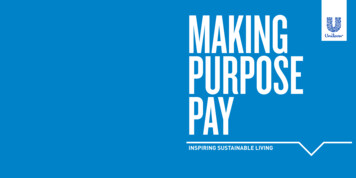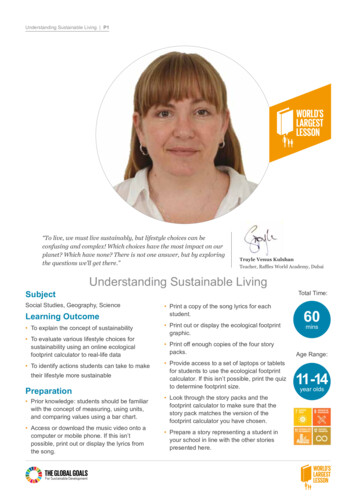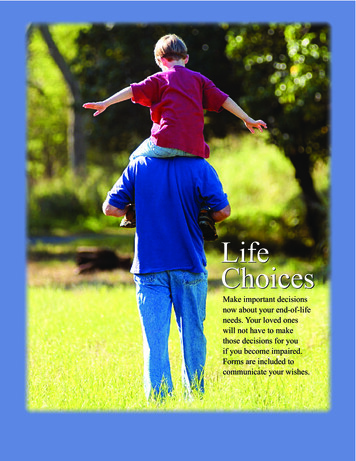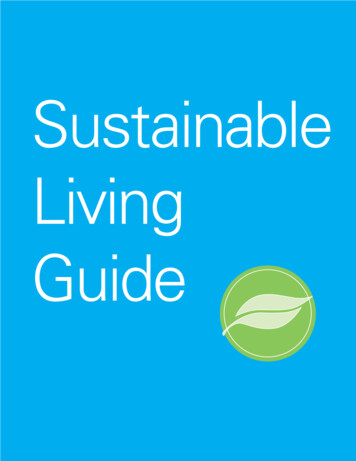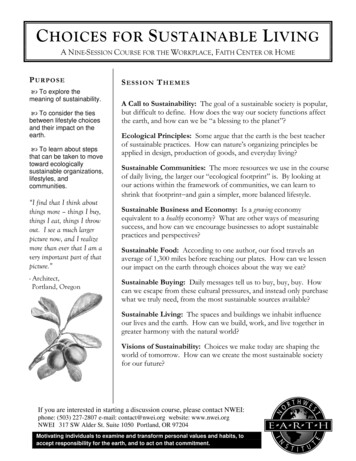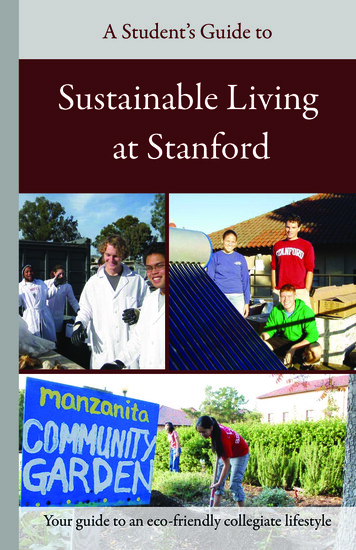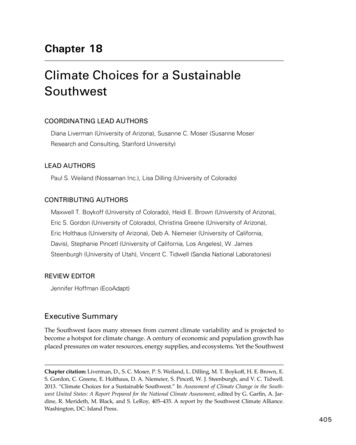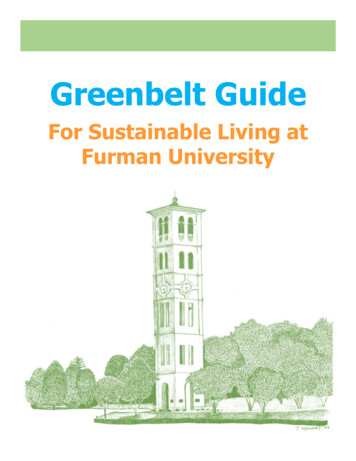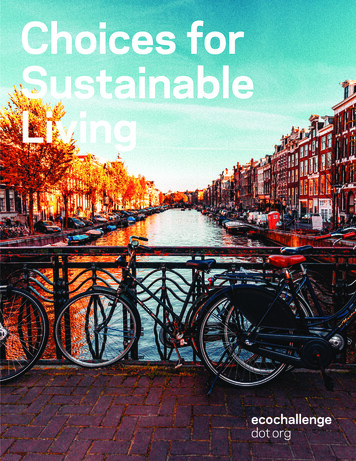
Transcription
Choices forSustainableLiving
D I S C U S S I O NC O U R S EO NCHOICES FORSUSTAINABLELIVING
2Copyright 2012, 2014, 2018, 2019ByEcochallenge.org107 SE Washington StreetPortland, OR 97214(503) quests for permission to reproduce any materialsin this course book should be directed toEcochallenge.org.See “Permissions” page for publication and copyright information;these cannot be reproduced without separate permission.Layout and Typography: Margaret ParkerCover Design: Lee BensonCurriculum Development and Editing: Lacy CagleThis publication was printed using 100 percent post-consumer waste,FSC certified recycled paper, and UV inks (voc-free), and is 100% process-chlorine free.This publication was produced using windmill-powered energy through Premier Press. ECOCHALLENGE.ORG
3T A B L EO FCONTENTSABOUT ECOCHALLENGE.ORG . . . . . . . . . . . . . . . . . . . . . . . . . . . . . . . . . . . . . . . . . . . . . . . . . . . . . . . . . . . . . . . . . . . . . . . . . . . . . . . . . . . . . . . . . . . . . . . . . . . . . 5ABOUT THIS CURRICULUM . . . . . . . . . . . . . . . . . . . . . . . . . . . . . . . . . . . . . . . . . . . . . . . . . . . . . . . . . . . . . . . . . . . . . . . . . . . . . . . . . . . . . . . . . . . . . . . . . . . . . . . 6INTRODUCTION. . . . . . . . . . . . . . . . . . . . . . . . . . . . . . . . . . . . . . . . . . . . . . . . . . . . . . . . . . . . . . . . . . . . . . . . . . . . . . . . . . . . . . . . . . . . . . . . . . . . . . . . . . . . . . . . . . . . . 8GUIDELINES. . . . . . . . . . . . . . . . . . . . . . . . . . . . . . . . . . . . . . . . . . . . . . . . . . . . . . . . . . . . . . . . . . . . . . . . . . . . . . . . . . . . . . . . . . . . . . . . . . . . . . . . . . . . . . . . . . . . . . . . . 10EVALUATION. . . . . . . . . . . . . . . . . . . . . . . . . . . . . . . . . . . . . . . . . . . . . . . . . . . . . . . . . . . . . . . . . . . . . . . . . . . . . . . . . . . . . . . . . . . . . . . . . . . . . . . . . . . . . . . . . . . . . . . . 13SESSION ONE: A CALL TO SUSTAINABILITY. . . . . . . . . . . . . . . . . . . . . . . . . . . . . . . . . . . . . . . . . . . . . . . . . . . . . . . . . . . . . . . . . . . . . . . . . . . . . . . . . . . . 15“Our View of Sustainability” by Felipe Ferreira . . . . . . . . . . . . . . . . . . . . . . . . . . . . . . . . . . . . . . . . . . . . . . . . . . . . . . . . . . . . . . . . . . . . . . . . . . . . . . 17“Culture Tree” by Zaretta Hammond. . . . . . . . . . . . . . . . . . . . . . . . . . . . . . . . . . . . . . . . . . . . . . . . . . . . . . . . . . . . . . . . . . . . . . . . . . . . . . . . . . . . . . . . . 20“You Are Brilliant, and the Earth is Hiring” by Paul Hawken . . . . . . . . . . . . . . . . . . . . . . . . . . . . . . . . . . . . . . . . . . . . . . . . . . . . . . . . . . . . . . . . 23“Our Home on Earth” by Winona LaDuke . . . . . . . . . . . . . . . . . . . . . . . . . . . . . . . . . . . . . . . . . . . . . . . . . . . . . . . . . . . . . . . . . . . . . . . . . . . . . . . . . . . . 25Thoughts on Sustainability. . . . . . . . . . . . . . . . . . . . . . . . . . . . . . . . . . . . . . . . . . . . . . . . . . . . . . . . . . . . . . . . . . . . . . . . . . . . . . . . . . . . . . . . . . . . . . . . . . . 28“Systems Thinking: A Necessary Perspective in our Changing World” by the Worldwatch Institute. . . . . . . . . . . . . . . . . . . . 29A Systems Thinking Model: The Iceberg. . . . . . . . . . . . . . . . . . . . . . . . . . . . . . . . . . . . . . . . . . . . . . . . . . . . . . . . . . . . . . . . . . . . . . . . . . . . . . . . . . . . . 30SESSION TWO: ECOLOGICAL PRINCIPLES. . . . . . . . . . . . . . . . . . . . . . . . . . . . . . . . . . . . . . . . . . . . . . . . . . . . . . . . . . . . . . . . . . . . . . . . . . . . . . . . . . . . . 33“You Can’t Do Just One Thing: A Conversation with Richard Heinberg” by Michael K. Stone . . . . . . . . . . . . . . . . . . . . . . . . . . . . 35“Ecological Principles” by Michael K. Stone. . . . . . . . . . . . . . . . . . . . . . . . . . . . . . . . . . . . . . . . . . . . . . . . . . . . . . . . . . . . . . . . . . . . . . . . . . . . . . . . . 37“The Anthropocene Epoch: Scientists Declare Dawn of Human-Influenced Age” by Damian Carrington. . . . . . . . . . . . . . .38The Four System Conditions of a Sustainable Society. . . . . . . . . . . . . . . . . . . . . . . . . . . . . . . . . . . . . . . . . . . . . . . . . . . . . . . . . . . . . . . . . . . . . . 41“The Refugee Crisis is a Sign of a Planet in Trouble” by David Korten. . . . . . . . . . . . . . . . . . . . . . . . . . . . . . . . . . . . . . . . . . . . . . . . . . . . . 42“The Earth Is Full” by Paul Gilding. . . . . . . . . . . . . . . . . . . . . . . . . . . . . . . . . . . . . . . . . . . . . . . . . . . . . . . . . . . . . . . . . . . . . . . . . . . . . . . . . . . . . . . . . . . . 43“Too Many People, Too Much Consumption” by Paul Ehrlich and Anne H. Ehrlich. . . . . . . . . . . . . . . . . . . . . . . . . . . . . . . . . . . . . . . . . 45SESSION THREE: FOOD. . . . . . . . . . . . . . . . . . . . . . . . . . . . . . . . . . . . . . . . . . . . . . . . . . . . . . . . . . . . . . . . . . . . . . . . . . . . . . . . . . . . . . . . . . . . . . . . . . . . . . . . . . . 48“What’s Eating America” by Michael Pollan . . . . . . . . . . . . . . . . . . . . . . . . . . . . . . . . . . . . . . . . . . . . . . . . . . . . . . . . . . . . . . . . . . . . . . . . . . . . . . . . . . 51“Cutting Meat Consumption Can Make a Huge Dent in Climate Change”by Fiona Harvey. . . . . . . . . . . . . . . . . . . . . . . . . . . . . . . . . . . . . . . . . . . . . . . . . . . . . . . . . . . . . . . . . . . . . . . . . . . . . . . . . . . . . . . . . . . . . . . . . . . . . . . . . . . . . . . 54“Stalking the Vegetannual” by Barbara Kingsolver. . . . . . . . . . . . . . . . . . . . . . . . . . . . . . . . . . . . . . . . . . . . . . . . . . . . . . . . . . . . . . . . . . . . . . . . . . 56Perspectives: Food Access. . . . . . . . . . . . . . . . . . . . . . . . . . . . . . . . . . . . . . . . . . . . . . . . . . . . . . . . . . . . . . . . . . . . . . . . . . . . . . . . . . . . . . . . . . . . . . . . . . . 59“From Food Security to Food Sovereignty” by Antonio Roman-Alcalá. . . . . . . . . . . . . . . . . . . . . . . . . . . . . . . . . . . . . . . . . . . . . . . . . . . . 60Growing Food, Growing Power. . . . . . . . . . . . . . . . . . . . . . . . . . . . . . . . . . . . . . . . . . . . . . . . . . . . . . . . . . . . . . . . . . . . . . . . . . . . . . . . . . . . . . . . . . . . . . . 62“Beyond ‘Free’ or ‘Fair’ Trade: Mexican Farmers Go Local” by Mike Wold . . . . . . . . . . . . . . . . . . . . . . . . . . . . . . . . . . . . . . . . . . . . . . . . . 62“We Can Feed the World with the Food We Waste” by Joanne Will . . . . . . . . . . . . . . . . . . . . . . . . . . . . . . . . . . . . . . . . . . . . . . . . . . . . . . . . 64SESSION FOUR: WATER . . . . . . . . . . . . . . . . . . . . . . . . . . . . . . . . . . . . . . . . . . . . . . . . . . . . . . . . . . . . . . . . . . . . . . . . . . . . . . . . . . . . . . . . . . . . . . . . . . . . . . . . . . 67“Water is Life” by Osprey Orielle Lake. . . . . . . . . . . . . . . . . . . . . . . . . . . . . . . . . . . . . . . . . . . . . . . . . . . . . . . . . . . . . . . . . . . . . . . . . . . . . . . . . . . . . . . 69“How Your Diet Contributes to Water Pollution” by Paul Greenberg. . . . . . . . . . . . . . . . . . . . . . . . . . . . . . . . . . . . . . . . . . . . . . . . . . . . . . 72“Water and Climate Change” by the Union of Concerned Scientists . . . . . . . . . . . . . . . . . . . . . . . . . . . . . . . . . . . . . . . . . . . . . . . . . . . . . . . 77“The Oceans are Drowning in Plastic — And No One’s Paying Attention” by Dominique Mosbergen. . . . . . . . . . . . . . . . . . . 78“Ocean Acidification” by the Climate Reality Project. . . . . . . . . . . . . . . . . . . . . . . . . . . . . . . . . . . . . . . . . . . . . . . . . . . . . . . . . . . . . . . . . . . . . . . 82“The Race to Save Florida’s Devastated Coral Reef from Global Warming” by Chris Mooney. . . . . . . . . . . . . . . . . . . . . . . . . . . 83C H O I C E S F O R S U STA I N A B L E L I V I N G Ta b l e o f Contents
4SESSION FIVE: COMMUNITY . . . . . . . . . . . . . . . . . . . . . . . . . . . . . . . . . . . . . . . . . . . . . . . . . . . . . . . . . . . . . . . . . . . . . . . . . . . . . . . . . . . . . . . . . . . . . . . . . . . . 86“This is What Democracy Looks Like” by Fred Kent . . . . . . . . . . . . . . . . . . . . . . . . . . . . . . . . . . . . . . . . . . . . . . . . . . . . . . . . . . . . . . . . . . . . . . . . 88“Six Foundations for Building Community Resilience” by Daniel Lerch. . . . . . . . . . . . . . . . . . . . . . . . . . . . . . . . . . . . . . . . . . . . . . . . . . . 89“The Urban Common Spaces that Show Us We Belong to Something Larger” by Sarah van Gelder. . . . . . . . . . . . . . . . . . . . . 91“Connecting the Lots” by Diana Budds, photography by Justin Fanti. . . . . . . . . . . . . . . . . . . . . . . . . . . . . . . . . . . . . . . . . . . . . . . . . . . . . . 92“What it Looks Like When Communities Make Racial Justice a Priority”by Zeobia Jeffries and Araz Hachadourian. . . . . . . . . . . . . . . . . . . . . . . . . . . . . . . . . . . . . . . . . . . . . . . . . . . . . . . . . . . . . . . . . . . . . . . . . . . . . . . . . . 96“How to Turn Neighborhoods into Hubs of Resilience” by Taj James and Rosa González. . . . . . . . . . . . . . . . . . . . . . . . . . . . . . . . 97SESSION SIX: TRANSPORTATION. . . . . . . . . . . . . . . . . . . . . . . . . . . . . . . . . . . . . . . . . . . . . . . . . . . . . . . . . . . . . . . . . . . . . . . . . . . . . . . . . . . . . . . . . . . . . . . 101“Reimagining Our Streets as Places: From Transit Routes to Community Routes” by Annah MacKenzie. . . . . . . . . . . . . 103“The Environmental Cost of Free 2-Day Shipping” by Andy Murdock. . . . . . . . . . . . . . . . . . . . . . . . . . . . . . . . . . . . . . . . . . . . . . . . . . . . 106Air Travel. . . . . . . . . . . . . . . . . . . . . . . . . . . . . . . . . . . . . . . . . . . . . . . . . . . . . . . . . . . . . . . . . . . . . . . . . . . . . . . . . . . . . . . . . . . . . . . . . . . . . . . . . . . . . . . . . . . . . . 107“America’s ‘Worst Walking City’ Gets Back on Its Feet” by Jay Walljasper. . . . . . . . . . . . . . . . . . . . . . . . . . . . . . . . . . . . . . . . . . . . . . . . 108“Millennials in Transit” by Derek Prall. . . . . . . . . . . . . . . . . . . . . . . . . . . . . . . . . . . . . . . . . . . . . . . . . . . . . . . . . . . . . . . . . . . . . . . . . . . . . . . . . . . . . . . . 111“City Planners Respond to Demands for Better Neighborhood Mobility and Bicycling Infrastructure”by Araz Hachadourian . . . . . . . . . . . . . . . . . . . . . . . . . . . . . . . . . . . . . . . . . . . . . . . . . . . . . . . . . . . . . . . . . . . . . . . . . . . . . . . . . . . . . . . . . . . . . . . . . . . . . . . . 113Possibilities for Cars. . . . . . . . . . . . . . . . . . . . . . . . . . . . . . . . . . . . . . . . . . . . . . . . . . . . . . . . . . . . . . . . . . . . . . . . . . . . . . . . . . . . . . . . . . . . . . . . . . . . . . . . . . 114“Retrofitting Suburbia: Communities Innovate Their Way Out of Sprawl” by Erin Sagen. . . . . . . . . . . . . . . . . . . . . . . . . . . . . . . . 115SESSION SEVEN: CONSUMPTION & ECONOMY. . . . . . . . . . . . . . . . . . . . . . . . . . . . . . . . . . . . . . . . . . . . . . . . . . . . . . . . . . . . . . . . . . . . . . . . . . . . . . . 118“Detroit Speech” by Robert F. Kennedy. . . . . . . . . . . . . . . . . . . . . . . . . . . . . . . . . . . . . . . . . . . . . . . . . . . . . . . . . . . . . . . . . . . . . . . . . . . . . . . . . . . . . 120Beyond the GDP. . . . . . . . . . . . . . . . . . . . . . . . . . . . . . . . . . . . . . . . . . . . . . . . . . . . . . . . . . . . . . . . . . . . . . . . . . . . . . . . . . . . . . . . . . . . . . . . . . . . . . . . . . . . . . . 121“What Isn’t for Sale?” by Michael J. Sandel. . . . . . . . . . . . . . . . . . . . . . . . . . . . . . . . . . . . . . . . . . . . . . . . . . . . . . . . . . . . . . . . . . . . . . . . . . . . . . . . . 122“Bringing People Back Into the Economy” by Vandana Shiva . . . . . . . . . . . . . . . . . . . . . . . . . . . . . . . . . . . . . . . . . . . . . . . . . . . . . . . . . . . . . 125Where Our Paychecks Go. . . . . . . . . . . . . . . . . . . . . . . . . . . . . . . . . . . . . . . . . . . . . . . . . . . . . . . . . . . . . . . . . . . . . . . . . . . . . . . . . . . . . . . . . . . . . . . . . . . . 128“Beyond Consumerism” by New Dream. . . . . . . . . . . . . . . . . . . . . . . . . . . . . . . . . . . . . . . . . . . . . . . . . . . . . . . . . . . . . . . . . . . . . . . . . . . . . . . . . . . . . 128True Price Questions. . . . . . . . . . . . . . . . . . . . . . . . . . . . . . . . . . . . . . . . . . . . . . . . . . . . . . . . . . . . . . . . . . . . . . . . . . . . . . . . . . . . . . . . . . . . . . . . . . . . . . . . . . 131SESSION EIGHT: VISIONS OF SUSTAINABILITY . . . . . . . . . . . . . . . . . . . . . . . . . . . . . . . . . . . . . . . . . . . . . . . . . . . . . . . . . . . . . . . . . . . . . . . . . . . . . . 133“Neoliberalism Has Conned Us Into Fighting Climate Change as Individuals” by Martin Lukacs. . . . . . . . . . . . . . . . . . . . . . . 135” Hope is What We Become in Action” by Fritjof Cabra and Frances Moore Lappé. . . . . . . . . . . . . . . . . . . . . . . . . . . . . . . . . . . . . . . 137“Why Social Movements Need the Radical Imagination” by Alex Hhasnabish and Max Haiven. . . . . . . . . . . . . . . . . . . . . . . . 139“Ecopolis Iowa City: Envisioning a Regenerative City in the Heartland” by Jeff Biggers. . . . . . . . . . . . . . . . . . . . . . . . . . . . . . . . 142“It Was a Blighted City Block. But this Woman is Turning It Into a Solar-Powered Ecovillage”by Zenobia Jeffries. . . . . . . . . . . . . . . . . . . . . . . . . . . . . . . . . . . . . . . . . . . . . . . . . . . . . . . . . . . . . . . . . . . . . . . . . . . . . . . . . . . . . . . . . . . . . . . . . . . . . . . . . . . 145“Envisioning A Sustainable World” by Donella H. Meadows. . . . . . . . . . . . . . . . . . . . . . . . . . . . . . . . . . . . . . . . . . . . . . . . . . . . . . . . . . . . . . . 147CALL TO ACTION. . . . . . . . . . . . . . . . . . . . . . . . . . . . . . . . . . . . . . . . . . . . . . . . . . . . . . . . . . . . . . . . . . . . . . . . . . . . . . . . . . . . . . . . . . . . . . . . . . . . . . . . . . . . . . . . . . 152DONATION FORM. . . . . . . . . . . . . . . . . . . . . . . . . . . . . . . . . . . . . . . . . . . . . . . . . . . . . . . . . . . . . . . . . . . . . . . . . . . . . . . . . . . . . . . . . . . . . . . . . . . . . . . . . . . . . . . . . 155PERMISSIONS. . . . . . . . . . . . . . . . . . . . . . . . . . . . . . . . . . . . . . . . . . . . . . . . . . . . . . . . . . . . . . . . . . . . . . . . . . . . . . . . . . . . . . . . . . . . . . . . . . . . . . . . . . . . . . . . . . . . . 157I n tbrloedou fc tCi o n t e n t s TaECOCHALLENGE.ORG
5Our Vision. We believe in a bettershared future, one with fresh air tobreathe, clean water to drink, and astable climate to live in.Our Model for Change. And we believethat our individual behaviors are pivotalin creating this world, one that isrealized by the collective impact ofeveryday people raising voices andtaking action.Our Approach. We believe in solutions.Through our Ecochallenge Platform andDiscussion Courses, we connect youwith research-backed actions and withfellow humans who want to take theseactions with you. We show you how ourcollective behavior — and your personaltransformation — connect withsomething big, shared, and better.Our Commitment to Justice & Equity.Our solutions-focused workencompasses upholding and revitalizingjust and equitable systems. We knowa better shared future can only existwhen we hold in earnest all inhabitantson this dot we call home.Together. We are connecting the dotsbetween our actions, our impact, andour will to create significant globalchange. Each time our dots areconnected, we take another stepforward, toward our better sharedfuture. So here we are. Let’s begin.C H O I C E S F O R S U STA I N A B L E L I V I N G About ECOCHALLENGE.ORG
6ABOUT THIS CURRICULUMLacy Cagle (Editor) is the Director ofLearning at Ecochallenge.org, where sheoversees the development of discussioncourses and other educational programs,and chairs Ecochallenge.org’s Diversity,Equity and Inclusion Committee. She holds a MS inEducational Leadership and Policy with a focus onLeadership in Sustainability Education from Portland StateUniversity. Lacy’s expertise is in sustainability pedagogy,transformative learning, and behavior change. When notworking on sustainability-related projects, she sustainsherself by exploring new and old places, cooking, playingtrivia, and hanging out with her amazing rescue pup, Huey, inSt. Louis, Missouri.CURRICULUM COMMITTEEThis discussion course would not exist without theexpertise and time volunteered by the people on ourcurriculum committee. Ecochallenge.org would like to offersincere and deep appreciation for the many hours of timethey collectively invested in this project.Emily Mauro (Curriculum andResearch Intern) is responsible forhelping with curriculum developmentwith Ecochallenge.org, particularly withdeveloping and publicizing a new program onsustainability leadership for change. Her trip to Ecuadorin 2015 shed some light on the Rights of Nature, Ecuador’saddition to its constitution in 2008. This led her to probe theethics of biocentrism–ultimately altering her perception ofthe complex natural world that we are all a part of. She isinterested in further exploring the intersections betweensocial equity and environmental sustainability, along withenvironmental stewardship and its relation to human health.She spends her free time planting trees in urban settings,and volunteering on local farms.Margaret Parker (Layout Editor) isa freelance graphic artist in Portland,Oregon. She says that after taking severalEcochallenge.org courses that were “lifechanging,” she jumped at the opportunity to beinvolved in the creation of Ecochallenge.org course books.Margaret is a native of the Pacific Northwest, spent a yearin Poland, and has lived in Portland for the past 13 years.I nbt rooudtu cTthi oi sn C u r r i c u l u m ALee Benson (Cover Designer) is a freelancegraphic designer living in Portland, Oregon.After obtaining a Bachelor’s degree in Film& Digital Media, he moved to Portland tostudy design, earning an AAS at PortlandCommunity College. Since graduating, he has been soleproprietor of City Limit Design. He enjoys working withlocal nonprofits that work to improve quality of life. In hisspare time, he enjoys crafting cocktails, riding his bike andwatching classic movies.Miguel Arellano enjoys taking advantageof the all the great adventures Oregon has tooffer with his partner and daughters. Miguel iscurrently the Coordinator of the MulticulturalCenter at Portland Community College,where he provides transformative learning opportunitiesfor students through leadership, social change, and civicengagement opportunities where students can engage inshaping a better self and a better world. Miguel’s passionlies in the power of education and stories, both in andoutside the classroom.Rick D. Barnes is Professor of Psychologyand Environmental Studies at RandolphCollege in Lynchburg, Virginia, where heteaches courses in social psychology, historyof psychology, and environmental studies. Hereceived his BA in psychology from Vanderbilt Universityand his Ph.D. in social and environmental psychologyfrom the University of Wisconsin—Madison. He was amember of the City of Lynchburg Planning Commission fornine years and has been active in promoting sustainabledevelopment at the local level. Dr. Barnes has givenworkshops and presentations on sustainable campus andcity planning at national and international conferences, andhas taught courses in sustainable lifestyles and sustainablecommunities with the Semester at Sea program.ECOCHALLENGE.ORG
7Lisa L. Cagle conducts Public PolicyResearch through her role at Bi-StateDevelopment Research Institute in St. Louis,Missouri. She holds a Master of Arts inPhilosophy from the University of Missouri –St. Louis (UMSL), and studied sustainable development atthe University of Oslo in Norway on a Fulbright Fellowship.Lisa’s current research examines transportation policyfrom a social and racial justice perspective. Lisa staysbusy outside of her work at Bi-State as a leader and activeparticipant in numerous community action groups. She isalso a member of the St. Louis Earth Day board of directors.Jenn DeRose is Program Manager of theGreen Dining Alliance (GDA), a program of St.Louis Earth Day. The Green Dining Allianceis a certification program for St. Louis-arearestaurants to assess and improve theirsustainable practices, which include reducing their waste,water, and carbon footprint, while encouraging the sourcingof local, responsibly raised foods. The GDA also works toeducate the public about waste reduction, energy and waterconsumption, and the importance of fostering a healthy,resilient food system. Jenn is a freelance writer for theRiverfront Times, student of Sustainability at WashingtonUniversity, and a LEED GA. She enjoys camping, foraging,birdwatching, vegan brownies, and cycling.Felipe Ferreira (pronouns: he/him/his,they/them/theirs) is a dreamer and buddingsustainability educator hailing from Brasilia,Brazil. He has recently graduated fromPortland State University with a master’sdegree in Educational Leadership and Policywith emphases in Leadership for Sustainability Educationand Gender, Race, and Nations. As a critical sustainabilityscholar, his research interests include productions ofnature, popular culture and sustainability, and criticalconsciousness development.C H O I C E S F O R S U STA I N A B L E L I V I N G Viniece Jennings, Ph.D., is a researchscientist based in Athens, Georgia, whoexplores the role of urban green spaces onvarious aspects of health and well-being.Through the years, she has also been involvedin initiatives to enhance environmental and sustainabilityeducation. Viniece is also a Senior Fellow with theEnvironmental Leadership Program.Betty Shelley has been anEcochallenge.org volunteer since 1994. Bettyoften tells people “Ecochallenge.org haschanged my life.” She is a Master Recycler anda former Recycling Information Specialistfor Metro Regional Government in Portland,Oregon. In addition, she and her husband have producedjust one 35-gallon can of garbage per year since 2006. Sheoffers “Less is More” classes on reducing resource wastein the Portland area. In 2013, she was honored with theNW Earth Institute Founders Award, recognizing her vastcontributions to both Ecochallenge.org and sustainabilityeducation and practice more broadly.Liz Zavodsky is the Director ofMembership and Engagement atEcochallenge.org . Liz oversees programengagement with businesses nationwide,sponsorship and corporate partnerships, in addition tomanaging donor relationships and records. Before joiningEcochallenge.org , Liz worked in Higher Education andResidence Life. She received her BA from University ofNorthern Colorado, and her MA in Human Developmentfrom University of Denver. Previously, she and her husbandworked for Semester at Sea, and spent time living inEdinburgh, Scotland.About This Curriculum
8INTRODUCTIONAt this point, the idea of sustainability has infiltratedmost of our societies. “Sustainable” products, “sustainable”lifestyles, “sustainable” food, “sustainable” development —the term is used often and widely, and even contradictorily.Regularly, “sustainable” really means “less unsustainable,”which can be misleading, at best. The definitions andvisions of sustainability differ with each culture in whichit is envisioned, and with the agenda of each person ororganization promoting it. Sustainability is a complex andcontested concept, but at its essence represents the hopefor a healthy, just and bright future for us all. We offer this25th anniversary edition of Choices for Sustainable Livingas an opportunity to move beyond the hype to exploresustainability more deeply. The course focuses less ondefining sustainability than envisioning sustainability —what would a sustainable world look like? And how can wecreate it together?We also want to explore with you the idea of “choices”for sustainable living. Some of us have more choice oragency than others, and as individuals, our choices areoften constricted or manipulated by complicated andpower-laden systems (for example, recent reports suggestjust 100 corporations are responsible for the majority ofour greenhouse gas emissions). This course book focuseson the choices you do have, in your individual daily life, tocontribute to a healthier, more just and more sustainableworld. It also focuses on the choices you have to exercisebigger positive impact, by being a leader or agent of changein your communities and in larger systems.In order to explore the idea of choice, we have to lookat power and privilege as well. Those who have power andIntroduction privilege have bigger voices in our public conversations andoften have bigger impact in the world. The perspectives ofpeople with power often become the dominant ones, andsome of them can be or have been quite harmful. But justbecause a perspective is the dominant one, it does not meanit is the most accurate one. Not all opinions are equallyvalid. We can, however, come to better understandingsof sustainability that are grounded in evidence, context,and equity. With that in mind, we have exercised intentionin selecting articles that represent distinct views ofsustainability, but we have not represented them all. Wehave elevated less dominant perspectives to encourageconversation about what is both equitable and achievable.We have prioritized content that helps you to connectwith your peers, create a community of support, contrastdiffering views, reflect on your own values and assumptions,and move to action.Throughout this course, you will examine and envisionsustainability from individual, societal and globalperspectives. The readings are intended to invokemeaningful discussion. Each week as you meet with yourgroup, we invite you to bring your own experience andcritical thinking to the process. Whether you agree ordisagree, you will have an opportunity to clarify your viewsand values. Ultimately, we hope this process inspires youand others to make choices to live with more intentionon Earth.Choices for Sustainable Living is comprised of eightsessions designed for weekly discussion. Each sessionincludes readings, videos, Suggested Discussion Questions,one or more Suggested Group Activities, and a ReflectionECOCHALLENGE.ORG
9prompt. We suggest coming up with a group goal or projectduring the optional “Call to Action” session. This last sessionis encouraged as a way for your group to celebrate thecompletion of the course, share goals and progress andconsider ways the group might continue to work together.INTEGRATING WITH ECOCHALLENGEFor the first time ever, Choices for Sustainable Living isusing our Ecochallenge platform to enhance your learningexperience. Ecochallenge challenges you to choose actionsto reduce your impact and stick with each one for one week.You design your Challenge and set a goal that stretchesyour comfort zone and makes a difference for you, yourcommunity and the planet.Use Ecochallenge for the best possible experience ofthis course — it will allow your group to better connect,reflect, and act together by opening up new opportunitiespreviously unavailable. Not only does Ecochallenge helpyour group stay connected in between session meetings,it connects you to others, expanding your network toeveryone around the world who is participating in Choicesfor Sustainable Living. It extends your learning, by betterconnecting you to additional resources and opportunitiesfor action. It allows new opportunities for reflection withyour peers by allowing you to share your thoughts as theyarise and get feedback from your group. And Ecochallengeis proven to better incentivize your action by providingmore ideas for action, more accountability to yourcommitments, and more support for your attempts. You willsee the impact of your individual and Team actions, as wellas the collective impact of everyone participating in theChoices Ecochallenge.Here is how to use the Ecochallenge platform withthis course:1. Organize your discussion group as an EcochallengeTeam. Before your first session meeting, sign up for theEcochallenge using your unique Team URL, which yourTeam Captain will send to you. Through the Ecochallengeplatform, your Team will be able to connect with eachother outside of meetings and with other discussiongroup Teams around the world.2. Respond to Reflection prompts offered on thefirst page of each Session. Reflection prompts askparticipants to post their thoughts and feelings aboutthe session topic in their Ecochallenge Feed each week.Teammates can then respond to each other’s posts tooffer insight, support and encouragement.3. Choose an Action goal to complete on theEcochallenge platform. Follow the prompts in the“Putting It Into Practice” boxes at the end of the sessionreadings. These Actions are related to the content foreach session and help participants learn more, applytheir learning locally, and take action toward a moresustainable way of living. Participants are encouragedto set a goal that stretches their comfort zone andmakes a difference for themselves, their community,
CHOICES FOR SUSTAINABLE LIVING About ECOCHALLENGE.ORG. Introduction ECOCHALLENGE.ORG 6 About This Curriculum ABOUT THIS CURRICULUM Lacy Cagle (Editor) is the Director of Learning at Ecochallenge.org, where she oversees the developm
